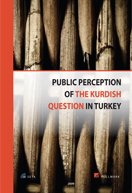According to Louise Arbour, the United Nations high commissioner for human rights, bigotry and prejudice against Muslims is increasing in Europe. Arbour made a call to all governments to take action against racism and discrimination towards Muslim communities. Arbour’s remarks are based on a recent study by Doudou Diene of Senegal.
Islamophobia, meaning the unfounded fear of Islam and Muslims, expresses a variety of acts of racism, discrimination and intolerance toward Muslim individuals and communities. Islamophobic acts manifest themselves in numerous ways; some are quite explicit and obvious, while others are quite subtle and implicit. They also may be accompanied by varying degrees of aggression. Sometimes this aggression comes in the form of verbal and physical attacks on Muslim individuals; in other cases, mosques, Islamic centers and places belonging to Muslims are attacked and desecrated. Also Muslim symbols and figures are ridiculed and derided in the print media. Negative stereotypes about Islam and Muslims are sometimes presented in news reporting, TV debates, political speeches and religious sermons. Many of these comments would be unacceptable if they were directed at Jews, blacks or other groups, but they are used much more freely for and about Muslims. The national and political loyalties of Muslims are questioned in that Muslim citizens of Western countries are accused of not belonging to society; they are presented as less committed to democracy, the constitution and human rights than others. In January 2004 a European journalist was able to write the following: “Arabs are threatening our civilian populations with chemical and biological weapons. They are promising to let suicide bombers loose in Western and American cities. They are trying to terrorize us and disrupt our lives.” The irony is that the journalist who wrote these sentences believed that Iran was an Arab country. What a remarkable example of ignorance and bigotry! The reason Islamophobia is bad for everyone is that it is created and sustained by a view of the self and the other that sees clash and confrontation as the primary, if not the only, way of relating to different cultures and communities. Whether through religious or secular arguments, the Islamophobic sentiment is derived from a set of values that must be called into question. The use of the term Islamophobia began in the 1980s. The 1997 Runnymede Report called “Islamophobia: A Challenge for Us All” was launched in November 1997 by the then British Home Secretary Jack Straw. The report defined Islamophobia as “the dread, hatred and hostility towards Islam and Muslims perpetrated by a series of closed views that imply and attribute negative and derogatory stereotypes and beliefs to Muslims.” The report also added that Islamophobia is based on “an outlook or worldview involving an unfounded dread and dislike of Muslims, which results in practices of exclusion and discrimination.” Defined in these broad terms, Islamophobia covers a large arena from politics and immigration to schools and the workplace. While the term continued to be used in various ways, the first major report after the attacks of Sept. 11 was published by the European Monitoring Center on Racism and Xenophobia (EUMC). Entitled “Summary Report on Islamophobia in the EU after 11 September 2001,” the report documented the acts of discrimination and racism against Muslims in 15 EU member countries. The report’s findings show that “Islamic communities and other vulnerable groups have become targets of increased hostility since 11 September. A greater sense of fear among the general population has exacerbated already existing prejudices and fuelled acts of aggression and harassment in many European member states. At the same time, attempts to allay fears sometimes led to a new interest in Islamic culture and to practical inter-faith initiatives.”Islamophobia is a form of racism and must be rejected by all con









